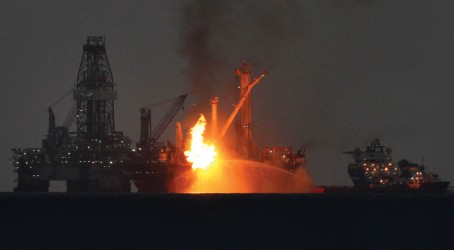Perhaps inevitably, David Eyton, head of technology at oil and gas giant BP, frames all his answers with reference to the Deepwater Horizon disaster of 2010. “The objective for technology development in BP is first and foremost to make sure we run safe and reliable operations,” he says.
“It’s not unsurprising given the things that have happened to us over the last few years, but we were already spending a lot of money on safety.
“A big focus is drilling and subsea operations. I regard safety as the ticket to the game, and I don’t view myself as free to develop other areas until we’ve ensured we are doing all we can do there.”
Eyton is a chartered engineer who has enjoyed a 30-year career at the oil major, taking in posts in Australia, the UK, US and Trinidad. He mixes an engineer’s practicality with a flair for business. He is quick to point out the measures the company has taken in technological terms in response to Deepwater Horizon, following which BP produced an internal report with a list of recommendations.
Eyton says: “We have both raised the standards and raised the quality control around the way in which we operate blow-out preventers (BOPs). For example, we require more rams in the BOP than we had specified in the past and that the industry has traditionally used. We require third-party validation of the integrity of BOPs every single time we deploy them.
“And we have now developed a new technology, a monitoring device which will give us realtime readout of all the functionality of a BOP, which we deployed for the first time in Brazil recently. We have much more stringent requirements now around our cementing operations and the validation of cement quality to make sure that it can be relied upon.”
Some have suggested that better information could perhaps have provided a warning sign that things were going wrong at the Macondo well. It is thought that better access to data might have signalled a problem.
“So now we’re making sure that all that data is coming together in an accessible form, in a way that tells you what’s happening in real time, better than we have had in the past. That not only benefits the safety of BP’s operations, it also improves the quality and efficiency of our drilling more generally. It’s a more intelligent approach.”
Other approaches involve the development of technologies that can unlock new reserves of oil and gas. “Access to hydrocarbons is absolutely key,” says Eyton. “But you have to know where they are. We will continue to invest in seismic technology and imaging technology – that will remain a massive driver of our programmes.”
Another important factor is getting more out of existing resources through techniques such as enhanced oil recovery, which has come to the fore in the past 10 years. Only 30-35% of oil and gas in existing reserves is actually recovered through conventional drilling.
“Many of the world’s hydrocarbons are discovered, but the prognosis for getting them is pretty poor,” says Eyton. “It’s only really in the last five to 10 years that we’ve had these scientific methods to enable us to look at what’s going on in the tiny holes in the rock that contain the oil and the water, to figure out why two thirds of it is staying there and the other third is coming out. You can then undo the ability of rock to hang on to oil inside these tiny holes and allow it to flow toward the wells.”
Another area that BP is working on is the exploitation of shale gas, especially in the US. Eyton says the controversial process of “fracking” has been around for more than 50 years, so hardly qualifies as a new technique. Its dangers may have been overstated, he argues.
“There are concerns,” acknowledges Eyton. “When you break open the rock underground, which is what fracking does, and you pump water into it and it pushes the rock apart and makes channels through the rock, when you do that you can induce something called ‘micro-seismicity’, and generate other cracks.
“The key is to steer clear of very large natural fractures in the rock. My understanding is that where this has generated really quite modest seismic activity as opposed to micro-seismic activity is where injection has occurred into really large fractures. Then, you can get some seismic activity which is just about detectable, but there has been no significant seismic activity ever caused by this. And seismic activity is going on the whole time everywhere in the world.”
Contamination of groundwater is another concern cited by opponents of fracking. Eyton says it’s a matter of responsibility on behalf of the driller to ensure that contaminated water used in fracking is disposed of appropriately.
“There’s nothing new about producing lots of water out of wells,” he says. “At BP, we produce far more water out of wells than we produce oil. You have to handle that responsibly. If you don’t handle that responsibly, and you dump highly saline water or water which may have some fracking chemicals in and dump it into water courses, that’s a stupid thing to do.
“There needs to be responsible action by operators to ensure that they don’t allow that to impact the environment. That they clean it up or dispose of it in a way that’s approved by the authorities.”

Eyton is in no doubt as to the scale of opportunity that shale gas represents. In the UK, the Institution of Mechanical Engineers has called for the resource to be exploited as a means of economic regeneration in the North West and North East, and the Chancellor mentioned shale gas during his speech at the recent Conservative party conference. New environment secretary Owen Paterson is also believed to be a fan.
Eyton says a million barrels of oil a day is being produced from shale in the US. “This is not a particularly innovative technology, it’s an innovative application of an existing technology. But it is dramatic because the amount of hydrocarbons locked up in shale around the world is a huge amount – especially gas,” he says. “This has the potential to significantly increase the gas that’s available in the world. It’s not exactly rocket science to know where it is. The key is whether that particular kind of shale can be broken up and produced.”
As well as the UK potential, there is speculation about reserves in Eastern Europe and China. “People are conjecturing whether it will happen in the UK. It all depends on whether companies are able to get commercial flow rates out of shales – they haven’t done that yet, and not all shales work. Just because you break it open doesn’t mean that the gas in these tiny little holes in the rock will make its way toward the fracture.”
Eyton adds: “The mechanisms by which that happens are not at all well understood because of the nature of the shales. The microstructure is so small that we do not really have the mechanisms to be able to accurately describe it. If it works in the UK it will generate economic activity – but it’s an ‘if’.”
In Britain, the image sometimes portrayed of a North Sea oil industry that is fading away is not hindering BP as it recruits new engineers, scientists and geologists, says Eyton. “For some reason people think that oil and gas is not going to be around for very long; well, that’s not true. The North Sea is in decline, but it will go on for many decades to come.
“It will be more difficult, so it will actually be higher tech – there will be more technology deployed, and that’s quite exciting in its own right. The industry will go on and, globally, it’s likely to be at the same scale as it is today in 2050.
“That should give people confidence they can have a complete career in this industry and a very stimulating one at that, because I would argue that our industry integrates more forms of science and technology than almost any other sector, even defence and aerospace.”
He believes engineers should not be lost to banking and accountancy when they have many of the skills needed to not only develop technology, but also run businesses, as he has done. “I do tend to think engineers are pretty good – they tend to be practical people who can solve problems, and implicitly business tends to be about solving problems. You’re always challenging yourself to do better, to improve, to create new capabilities.
“Engineers have an absolutely critical role to play in our industry and in the world in tackling many global challenges such as moving toward sustainable energy systems. Many people do not appreciate how exciting a career in engineering can be and what a difference it can make.”
One of the areas in which engineers are already making a massive difference is renewable energy. “Renewable energy is something we’ve chosen to invest in,” says Eyton. “It is difficult for any major oil and gas company to ignore the fact that, ultimately, but a long way out beyond this century, you are looking at a resource that is naturally declining, and probably declining to a point where it is no longer able to supply all the needs of the world.
“Nations want secure, affordable and sustainable sources of energy. Historically these things have required large government subsidies. And that can’t go on forever. Nonetheless, if there’s one major technological innovation I would like to see in my lifetime, it’s a more sustainable energy system.”
Part of this involves doing more with less; recognising that oil and gas are finite resources and behaving accordingly. “Car fuel efficiency standards are a good driver of that, and it’s extraordinary how the internal combustion engine has improved even in the last five years,” he says.
In an era of austerity when jobs are under threat, economic growth sluggish, and the future uncertain, Eyton still believes a company such as BP can provide a life-long career for today’s undergraduates.
“It depends on how long we carry on growing for, but it’s undoubtedly a global business. Somebody could join the oil
and gas industry and be absolutely confident in seeing their whole career through in the sector.
“I expect in 2050 we’ll be looking at an industry like the one today, that sees a future – just as we confidently see one now. In 50 years’ time we’ll still be putting as many reserves on the books as we’re taking off each year,” he concludes.

Climbing the BP career ladder
Before becoming group technology officer, David Eyton was BP’s exploration and production (E&P) vice-president for technology. In this role he was responsible for research and development, technical service work, digital and communications technology, and procurement and supply chain management for BP’s upstream business.
He also managed the Westlake Campus in Houston and led the development of a new approach to petrotechnical learning in E&P.
Eyton joined BP in 1982 from Cambridge University with an engineering degree. During his early career, he held various petroleum engineering, commercial and business management positions. In 1996, he was named general manager of BP’s North West Shelf interest in Australia. Eyton later managed Wytch Farm in Dorset and then BP’s gas businesses in Trinidad.
In September 2001, he became Lord John Browne’s executive assistant in the London HQ. Following that assignment, Eyton was vice-president of Deepwater Developments in the Gulf of Mexico.